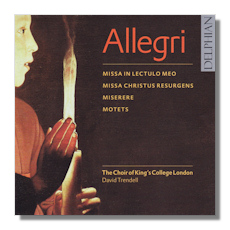
The Internet's Premier Classical Music Source
Related Links
- Allegri Reviews
- Latest Reviews
- More Reviews
-
By Composer
-
Collections
DVD & Blu-ray
Books
Concert Reviews
Articles/Interviews
Software
Audio
Search Amazon
Recommended Links
Site News
 CD Review
CD Review
Gregorio Allegri

Choral Music
- Missa In Lectulo Meo
- Miserere mei Deus
- Missa Christus resurgens
- Motet "Christus resurgens ex mortuis"
- Pierre Bonhomme: Motet "In lectulo meo"
The Choir of King's College London/David Trendell
Delphian DCD34103
This is a spirited, persuasive and beautiful set of performances. The temptation to render the sublime music of Allegri in any way glossy, glassy or glutinous has been studiously avoided. The composer's rich yet pungent polyphony is heard as crisp, clean and clear. The 30-strong Choir of King's College London under David Trendell knows what they are about. From the first note on this hour and twelve minute-long CD, their director's approach which allows the color, timbre and styles of individual singers to have as much room and air as the equally convincing collective sound invariably produced by the Choir works very well.
Allegri's Miserere, of course has – deservedly – a hundred recordings in the current catalog. It's included here in a performance that unselfconsciously brings to it a fresh, though graceful and dignified, perspective. The heights are gently reached, without fuss or spectacle. The scale is small and the feeling of the piece intimate in the hands of the Choir. The declamation of the non-choral portions is close and peaceful without being either mundane or lacking spirit; nor does it sound routine. On the other hand, these performers have not thrashed about trying to find a new way to present the work merely for the sake of it. There is an authenticity and familiarity that go some way towards recreating its essence in ways in which we can hear it as if we were not so familiar with it as we have become. In a word, fresh, again.
The same is true of all the singing on this CD. Listen, for instance, to the careful yet enthusiastic articulation of the Sanctus in the Missa Christus resurgens [tr.12]. Its precision, thoughtful pacing and space for each consonant to sound right to its end take nothing away from the wonder and respect that this mass movement should carry. The fact that these emotions occupy barely three minutes is further indicative of the acute sense which Trendell and the Choir have for Allegri's structure and architecture… there is sparseness and economy. But no lack of glow or impact. As this, and indeed the more somber Missa In Lectulo Meo, have notably shorter later movements, none of the sense of control or substance on Allegri's part are sacrificed for effect. Yet the singing is arresting and pleasing in the extreme.
Neither of the other two Masses (Allegri wrote a total of five), Missa In Lectulo Meo and Missa Christus resurgens is otherwise available on CD. Even if these performances were not so full as they are of vigor and elegance, gentility with supreme confidence, they alone would be worth the price of the CD. The Choir of King's College London has the gift of projecting the essence of this music, its use in service of confessional goals, its beauty and profundity, its sense of the times in which it was written and the rich liturgical world it served – the vibrancy of the Counter-Reformation.
This context meant that Allegri (1582-1652) was required to blend an assertive renewal in the light of the recent rise of Protestantism with the consequent jolt to collective confidence towards which the latter's principles insisted. Rome was alight with new artistic currents, movements and consequent reflection. Allegri, writing a couple of generations after Palestrina, built on the former's innovations and sense of purpose. Allegri can be seen as conservative, staying with the stile antico just as Monteverdi drew on the new genre of opera and built a more dramatic world.
Yet this choir's approach is vivacious and infused with life. This is not just because the two masses are written for eight voices. The textures are thick and full of event. Under Trendell the Choir makes the most of the multiplicity of lines and the richness of the sound. But it doesn't produce accounts which are overblown or built on excitement for its own sake. Listening to what for most people will be new masses means experiencing music that's invigorating with an appropriate rawness, almost; without being novel or searching for energy that isn't really there. Both masses blossom and extend into territory that sounds both pristine and authoritative in these highly technically competent performances. Color, heat, attack are all tempered with gravity and precision. The motet on which the Missa Christus resurgens is based is also sung [tr.10] after its credo. Its transparency and economy, typical and indicative of the post-Tridentine tendency towards greater intelligibility, are conveyed well. This approach also communicates the Choir's comfort with Allegri's idiom: they are ultimately very much at home; and not performing glorious music only as… music for glory.
The acoustic, that of an inner London church, is surprisingly suitable to this music. It's resonant yet not overpowering. The recording quality is excellent and fosters our appreciation of the power and faith which Allegri's music always exhibits. The resulting sound is a satisfying yet stimulating one; after hearing these three works, we are neither tired nor enervated by the concentration which Trendell effortlessly commends us to extend in understanding Allegri's world. The booklet is of high quality with brief notes on music and performers with texts in Latin and English translations. Altogether another winner from Delphian.
Copyright © 2012, Mark Sealey.





















